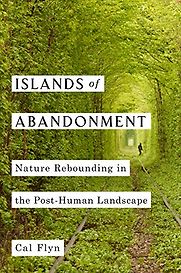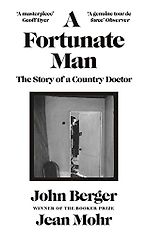Islands of Abandonment: Life in the Post-Human Landscape
by Cal Flyn
Five Books deputy editor Cal Flyn’s second work of nonfiction, Islands of Abandonment, is a book about abandoned places: ghost towns and exclusion zones, no man’s lands and post-industrial hinterlands – and what happens when nature is allowed to reclaim its place. Exploring extraordinary places where humans no longer live – or survive in tiny, precarious numbers – Islands of Abandonment give us a glimpse of what nature gets up to when we’re not there to see it. From Tanzanian mountains to the volcanic Caribbean, the forbidden areas of France to the mining regions of Scotland, Flyn brings together some of the most desolate, eerie, ravaged and polluted areas in the world – and shows how, against all odds, they offer our best opportunities for environmental recovery.
Recommendations from our site
“What makes it different is that while it’s certainly not a pollyannaish book—it’s not ‘don’t worry about the environment, it’s all going to be fine’—she does find a counter-narrative. She takes us to these desolate places where man has retreated, having apparently spoiled the place for good: Chernobyl, a World War One arsenic factory in France, Bikini Atoll. She goes to these eerie places, these unattractive places, these broken places, places that you wouldn’t wish on your worst enemy, and finds that nature has seeded itself there and is doing interesting things…….Also, although it’s very beautiful writing, the lyricism is really kept under control, for which I’m eternally grateful. Nature writing can become so performative. This is very disciplined. Yes, she can write a beautiful sentence, but it is always in service of what she’s trying to tell us. I thought that was great.” Read more...
The Best Nonfiction Books: The 2021 Baillie Gifford Prize Shortlist
Kathryn Hughes, Literary Scholar
“Flyn has decided to go to places where, for one reason or another, the landscape is no longer sustainable for human life and, as may be, for many other forms of life too. The book asks us to consider ‘What is the consequence of all this ruination? What is it likely to do to us as well as to nature?’ The result is an intriguingly twisted and adjusted form of nature writing, applied to sites of catastrophe, slow or sudden, where nature and a few strangely resilient people may be finding their way into a new kind of existence.” Read more...
The 2021 British Academy Book Prize for Global Cultural Understanding
Patrick Wright, Historian
“This is so beautifully written, it’s poetic. She takes us to a variety of places that we have, frankly, mucked up and then abandoned, or just abandoned. So, Chernobyl where we mucked it up and then ran away; Detroit where the economy collapsed, and there are just all these empty properties; Scottish slag heaps, ‘bings’ they call them, and they’re made from ‘blaes’ which are small bits of shale gravel; a Scottish island where the last people left in 1974, leaving their cattle behind. She then charts what happened next, how nature recovers and copes and, in some cases, invents something else, something that will put up with radiation, say. She doesn’t let us off. There’s no suggestion that ‘it’s okay, whatever we do, nature will survive it.’ You do realize it’s very bad, but it’s a beautiful book.” Read more...
Other books by Cal Flyn
Our most recommended books
-

Stasiland: Stories from Behind the Berlin Wall
by Anna Funder -

A Fortunate Man: The Story of a Country Doctor
by Jean Mohr & John Berger -

Factory Girls
by Leslie T Chang -

Among Schoolchildren
by Tracy Kidder -

The Shadow of the Sun
by Ryszard Kapuściński -

Guest House for Young Widows: Among the women of ISIS
by Azadeh Moaveni








The book, according to the author